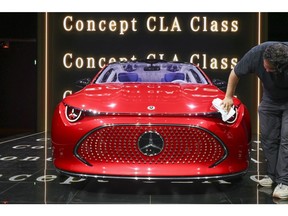Article content
(Bloomberg) — Carmakers that have counted on public funds to support their changeover to electric vehicles are warning the transition will take longer and paying out billions to shareholders.
It’s a trend that could come back to bite as politicians in the US and Europe campaign on green policies ahead of major elections this year on both sides of the Atlantic.
Article content
General Motors, Ford and Stellantis spent a combined $22.7 billion repurchasing shares and paying dividends last year, while Renault earlier this month proposed its biggest remittance since 2019. Mercedes-Benz is following up a €4 billion ($4.34 billion) repurchase initiated a year ago with another €3 billion this year and vowing more to come.
The largesse opens the companies up to potential criticism from both sides of the divide over climate policy. The optics of shareholder enrichment in the midst of a slowdown in EV uptake isn’t helpful to politicians pushing measures to reduce emissions. Those opposing such efforts will have an easier time campaigning against government subsidies for battery manufacturing and plug-in car purchases.
Mercedes CEO Ola Källenius downplayed the risk last week when the luxury-car maker flagged that EVs won’t account for half its sales as soon as previously projected. He said Europe is making the right decision to free up public funds for sectors including battery cells and semiconductors that are strategically important and need the support of the state.
Article content
“We profit from subsidies,” Källenius told reporters on a call to discuss earnings. “But the capital that we invest is a multitude higher than the money we get from subsidies, and the corporate risk is higher.”
Mercedes said last week that it expects fully electric and plug-in hybrid vehicles to be stuck around 19% and 21% of its annual sales, roughly in line with last year. It’s now forecasting that EVs will account for half of sales in the second half of the decade, rather than in 2025.
General Motors and Ford are having similar growing pains. After setting a goal to produce 150,000 EVs last year, GM sold only half that amount. It’s delayed opening a second electric pickup plant in Michigan by a year, while Ford has slashed production plans for the F-150 Lightning and put off $12 billion of EV-related investment.
The combination of underwhelming EV sales and redirection of spending toward buybacks and dividends makes US President Joe Biden’s signature climate law all the more vulnerable. Donald Trump has vowed to gut the Inflation Reduction Act, which subsidizes both EV purchases and battery production.
Article content
The IRA pressured Europe to up its green game, lest its industrial base fall behind in the energy transition. Germany has pledged €10 billion in support for an Intel semiconductor facility and is backing battery upstart Northvolt with another €902 million, despite the government’s budget crisis. France announced €2.9 billion of support for chipmakers GlobalFoundries and STMicroelectronics and is luring companies to develop a battery corridor in the country’s north, a region synonymous with industrial decline.
Even with all the support, manufacturers are struggling to make money off electric cars. Ford’s EV business lost $4.7 billion last year, and the company has forecast a deficit of at least $5 billion for 2024. Mercedes, whose battery venture with Stellantis raised €4.4 billion this month from commercial and state banks, cautioned that EVs are still many years away from cost parity with cars powered by combustion engines.
In Europe, polls show right-wing parties that oppose strong climate action are likely to increase their representation after the European Union’s parliamentary elections in June. In the region’s biggest auto market, Germany’s Alternative für Deutschland party — which denies that climate change is man-made — is ahead of all three ruling parties in the polls. The UK already has softened some of its green policies, including around how long consumers will be able to continue buying new petrol and diesel cars.
Källenius said he doubts that politicians will begin to take shareholders returns into consideration as they consider future support for the industry.
“Policymakers rather think about how countries can stay competitive,” he said. “Capital moves to the countries with the highest return on investment.”
—With assistance from Wilfried Eckl-Dorna.
Share this article in your social network

